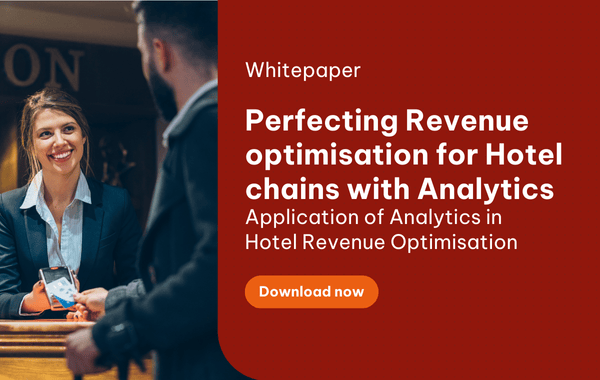A longstanding issue for hotel owners and managers is how to maximise revenue and occupancy rates despite the effects of seasonality. To be effective, revenue and yield management strategies need to consider seasonality, but all too often, hotels approach seasonality in blocks of time rather than looking at each day over a 365-day period, resulting in lost opportunities.
Learn more: Hospitality resource portal
Larger hotels, and in particular hotel chains, have been successful in adopting effective revenue management strategies. Smaller accommodation providers can still use revenue management strategies to their advantage on a smaller scale.

Contents
What is revenue management?
In essence, revenue management is the art of maximising income from a fixed number of hotel rooms. Being able to sell the right room for the right price at the right time without displacing a guest who would have been willing to pay more is the key.
To achieve this, you must first understand the value of the hotel room in the broader marketplace. This requires consideration of not just the quality but also being aware of the demand for your room (relative to the supply of similar or substantially the same rooms) on any given night.
Read more: How Data Analytics is changing hotel revenue management
Old-school revenue management
The traditional way of viewing seasonal pricing involved dissecting the year into blocks and charging prices accordingly—for high season, shoulder season, and low season.
Furthermore, the revenue manager may have only looked at the room revenue from the guest rather than the overall spending. This still happens across the board, as general managers, hotels in the competitive set, and others will share information based on average rates rather than other information that could set the hotel apart from the rest.
Infographic: Hospitality trends to look for in 2017
This general approach also led to a number of other old-school revenue management strategies, such as dropping room rates at the last minute to maximise occupancy and allocating fixed numbers of rooms to a particular market segment, channel, or individual guest.
These approaches also fail to factor in the cost of doing business and the overall spend in a hotel by market segment, channel, or individual guest.
Newer revenue management strategies
Better approaches towards revenue management are now being adopted by leading hotels and chains worldwide. Consider implementing these strategies in your revenue management systems:
Channel Management
Each channel of business has different costs related to the booking, so the relative net prices can be easily monitored. Any good revenue manager will take notice of the variations and adopt suitable revenue-maximising strategies accordingly.
For instance:
- Each channel may settle their accounts differently. Look at this and factor it into the costs of accepting their bookings via these channels.
- Look also at the costs of loyalty programs versus how each group spends in the hotel.
- Look strategically at bookings made via online travel agencies. Commissions are high, so examine how much these guests spend as well. Can you offer deals to entice them to book directly through you that would result in a higher net profit from the booking?
It is imperative to optimise IT systems
All too often, hotels have useful data but don’t know how to leverage it. Adopting effective IT systems (database software, analytic tools, etc.) can help managers analyse existing data, identify trends, and underscore future strategic decision-making.
Consider price fencing
Hotel owners can learn a lot from strategies that have been used effectively by airlines for some time now. Make rates a lot more restrictive to discounts, offer discounts to customers who book ahead rather than at the last minute, and hold firm with the customer on allowing changes.
This is something that hotels have struggled with for years.
Market mix
Look at each market mix carefully and pay attention to what each group will spend in the hotel. Conference groups are a high-yielding segment, for instance, and are also profitable for food and beverage outlets with more control over food costs.
Factor these considerations into your pricing strategies, and remember that maximising net revenue is your goal.
Read more: 5 tips to boost hotel direct revenue
Also revenue manage your hotel’s other profit centres where possible
This is a newer concept and requires some non-traditional thinking by hoteliers. For example, charging more for room rates during particularly busier conference periods and charging more for breakfast when the restaurant has to put more staff on to cope with demand.
Avoid sharing data with other hotels
Try to avoid sharing data with other hotels based on ADR since this does not further the overall strategy of your hotel. At the very least, perhaps consider being a little creative with the totals you are providing, and don’t think you are the only one doing that either!
Sell to the room type
One simple strategy that is often undervalued is selling to the room type! If you don’t stick to this approach, guests will expect an upgrade upon arrival. At the very least, offer the upgrade, but with an upgrade fee attached (albeit less than what they would have paid if they booked the better room in the first instance).
Popping it through the hotel’s PMS accurately will ensure you don’t pay any travel agents any unnecessary commissions.
Finally – look at each day individually
Adopt a strategy based on each day, taking into account all factors, rather than treating it as a "bulk."
Read more: 9 ways to increase Hotel Profits
Conclusion
No matter how big or small, revenue managers need to adopt a suitable strategy to maximise revenue for any given day. Systematically and methodically applying some of the new strategies outlined above will see hotels well on their way to a new era of profit maximisation.
A special mention goes to the General Manager of Hawthorn Suites Universal, the best suites in Orlando! and StaySky for contributing to this article.
 Carla C. Burton is a self-employed Travel and Hospitality writer with a BBA in Business Administration from Bond University. Although a Gold Coast native, Carla moved to Melbourne in 2008 to further her writing career in the Travel industry. Carla has become a top contributor to many travel blogs worldwide, including many resorts in Orlando, FL, and thoroughly enjoys the freedom that self-employment has provided her. To find out more about Carla or to follow her other posts, follow her on Twitter @CarlaCBurton
Carla C. Burton is a self-employed Travel and Hospitality writer with a BBA in Business Administration from Bond University. Although a Gold Coast native, Carla moved to Melbourne in 2008 to further her writing career in the Travel industry. Carla has become a top contributor to many travel blogs worldwide, including many resorts in Orlando, FL, and thoroughly enjoys the freedom that self-employment has provided her. To find out more about Carla or to follow her other posts, follow her on Twitter @CarlaCBurton
 English
English  Vietnamese
Vietnamese 





